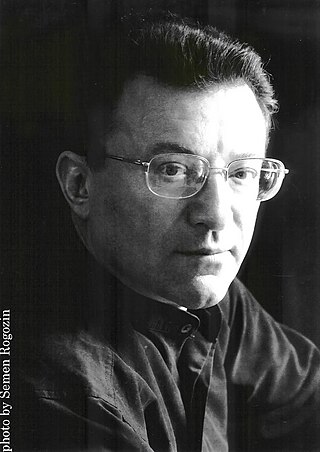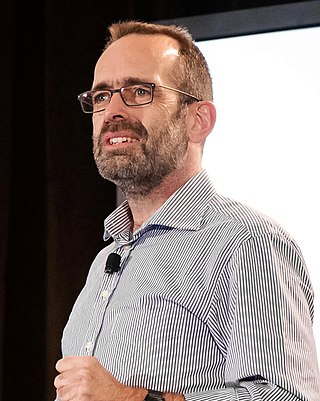The expression computational intelligence (CI) usually refers to the ability of a computer to learn a specific task from data or experimental observation. Even though it is commonly considered a synonym of soft computing, there is still no commonly accepted definition of computational intelligence.
Clyde Lee Giles is an American computer scientist and the David Reese Professor at the College of Information Sciences and Technology (IST) at the Pennsylvania State University. He is also Graduate Faculty Professor of Computer Science and Engineering, Courtesy Professor of Supply Chain and Information Systems, and Director of the Intelligent Systems Research Laboratory. He was Interim Associate Dean of Research in the College of IST. He graduated from Oakhaven High School in Memphis, Tennessee. His graduate degrees are from the University of Michigan and the University of Arizona and his undergraduate degrees are from Rhodes College and the University of Tennessee. His PhD is in optical sciences with advisor Harrison H. Barrett. His academic genealogy includes two Nobel laureates, Arnold Sommerfeld and prominent mathematicians.

Sankar Kumar Pal is a computer scientist and the President of the Indian Statistical Institute (ISI), Kolkata. He is also a National Science Chair, Government of India. Prof. Pal is a computer scientist with an international reputation on pattern recognition, image processing, fuzzy neural network, rough fuzzy hybridization, soft computing, granular mining, and machine intelligence. He pioneered the development of fuzzy set theory, and neuro-fuzzy and rough-fuzzy computing for uncertainty modelling with demonstration in pattern recognition, image processing, machine learning, knowledge-based systems and data mining. Prof. Pal is widely recognized across the world for his pioneering and extraordinary contributions in Machine Intelligence, Fuzzy Logic, Soft Computing and Pattern Recognition. This has made India a leader in these disciplines in international scenario. He founded the Machine Intelligence Unit in 1993, and the Center for Soft Computing Research: A National Facility in 2004, both at the ISI. In the process he has created many renowned scientists out of his doctoral students.

Eduardo Daniel Sontag is an Argentine-American mathematician, and distinguished university professor at Northeastern University, who works in the fields control theory, dynamical systems, systems molecular biology, cancer and immunology, theoretical computer science, neural networks, and computational biology.
Jiawei Han is a Chinese-American computer scientist and writer. He currently holds the position of Michael Aiken Chair Professor in the Department of Computer Science at the University of Illinois at Urbana-Champaign. His research focuses on data mining, text mining, database systems, information networks, data mining from spatiotemporal data, Web data, and social/information network data.

Jacek M. Zurada is a Polish engineer who serves as a Professor of Electrical and Computer Engineering Department at the University of Louisville, Kentucky. His M.S. and Ph.D. degrees are from Politechnika Gdaṅska ranked as #1 among Polish universities of technology. He has held visiting appointments at Swiss Federal Institute of Technology, Zurich, Princeton, Northeastern, Auburn, and at overseas universities in Australia, Chile, China, France, Germany, Hong Kong, Italy, Japan, Poland, Singapore, Spain, and South Africa. He is a Life Fellow of IEEE and a Fellow of International Neural Networks Society and Doctor Honoris Causa of Czestochowa Institute of Technology, Poland.
David B. Fogel is a pioneer in evolutionary computation.
James Kennedy is an American social psychologist, best known as an originator and researcher of particle swarm optimization. The first papers on the topic, by Kennedy and Russell C. Eberhart, were presented in 1995; since then tens of thousands of papers have been published on particle swarms. The Academic Press / Morgan Kaufmann book, Swarm Intelligence, by Kennedy and Eberhart with Yuhui Shi, was published in 2001.

Robert Jackson Marks II is an American electrical engineer, computer scientist and Distinguished Professor at Baylor University. His contributions include the Zhao-Atlas-Marks (ZAM) time-frequency distribution in the field of signal processing, the Cheung–Marks theorem in Shannon sampling theory and the Papoulis-Marks-Cheung (PMC) approach in multidimensional sampling. He was instrumental in the defining of the field of computational intelligence and co-edited the first book using computational intelligence in the title. A Christian and an old earth creationist, he is a subject of the 2008 pro-intelligent design motion picture, Expelled: No Intelligence Allowed.
Riccardo Poli is a Professor in the Department of Computing and Electronic Systems of the University of Essex. His work has centered on genetic programming.

Leonid Perlovsky is an Affiliated Research Professor at Northeastern University. His research involves cognitive algorithms and modeling of evolution of languages and cultures.
Okan Kadri Ersoy is a professor of electrical engineering and director of Statistical and Computational Intelligence Laboratory at Purdue University, West Lafayette School of Electrical and Computer Engineering. He is a Fellow of IEEE, a Fellow of OSA and a Fellow of ISIBM. Ersoy contributed to the research and education in computer science and engineering, artificial intelligence and bioinformatics. He is on the editorial boards of International Journal of Functional Informatics and Personalized Medicine and International Journal of Computational Biology and Drug Design. He is also on the advisory board of IJCBS.

Joseph Brant Arseneau is an entrepreneur and executive, best known for his work in both fintech and space technology. He is generally known in finance for his work in Electronic Trading, Renewable Energy Derivatives, and Capital Markets technology. He has been both a chief information officer (CIO) for large banks and an entrepreneur, having started several fintech start-ups. Arseneau has moved into the NewSpace industry and is currently a founding partner at 9Point8 Capital and a founder of Spaced Ventures.
Robert Kozma is First Tennessee University Professor of Mathematics at the University of Memphis.
Pravin Pratap Varaiya was Nortel Networks Distinguished Professor in the Department of Electrical Engineering at the University of California, Berkeley.
Yuhui Shi is a pioneer in particle swarm optimization algorithms and the developer of brain storm optimization algorithms. He was an electrical engineer from Xi'an Jiaotong-Liverpool University in Suzhou, China, where he was named a Fellow of the Institute of Electrical and Electronics Engineers (IEEE) in 2016 for his contributions to particle swarm optimization algorithms. He earned his PhD in electrical engineering from Southeast University, Nanjing, China in 1992, and was trained as a Post Doc Fellow at Concordia University under Canadian International Development Agency joint doctoral program, initiated by Prof. Jeremiah F. Hayes et al. He organized the first IEEE Symposium on Swarm Intelligence in 2003, and established the IEEE CIS Task Force on Swarm Intelligence in 2002, when he co-authored a book with James Kennedy and Russell C. Eberhart. He is a Chair Professor in the Department of Computer Science and Engineering, Southern University of Science and Technology (SUSTech), Shenzhen, China, where he invited Prof. Jun (Steed) Huang, from the Joint Institutes of Carleton University and the University of Ottawa, for a collboration on swarm intelligence robotics.

Amir Hussain is a cognitive scientist, the director of Cognitive Big Data and Cybersecurity (CogBID) Research Lab at Edinburgh Napier University He is a professor of computing science. He is founding Editor-in-Chief of Springer Nature's internationally leading Cognitive Computation journal and the new Big Data Analytics journal. He is founding Editor-in-Chief for two Springer Book Series: Socio-Affective Computing and Cognitive Computation Trends, and also serves on the Editorial Board of a number of other world-leading journals including, as Associate Editor for the IEEE Transactions on Neural Networks and Learning Systems, IEEE Transactions on Systems, Man, and Cybernetics (Systems) and the IEEE Computational Intelligence Magazine.

Janusz Kacprzyk is a Polish engineer and mathematician, notable for his contributions to the field of computational and artificial intelligence tools like fuzzy sets, mathematical optimization, decision making under uncertainty, computational intelligence, intuitionistic fuzzy sets, data analysis and data mining, with applications in databases, ICT, mobile robotics and others.

Thomas L. Dean is an American computer scientist known for his work in robot planning, probabilistic graphical models, and computational neuroscience. He was one of the first to introduce ideas from operations research and control theory to artificial intelligence. In particular, he introduced the idea of the anytime algorithm and was the first to apply the factored Markov decision process to robotics. He has authored several influential textbooks on artificial intelligence.

Michael R. Berthold is a German computer scientist, entrepreneur, academic and author. He is a professor, and chair for bioinformatics and information mining at Konstanz University, and an honorary professor at Óbuda University. He is also the co-founder of KNIME, and is serving as a president and CEO of KNIME AG since 2017.









